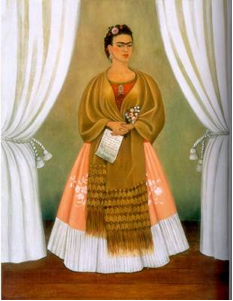“I paint myself because I am so often alone.” —Frida Kahlo
Dissipated, they walked to bars, and I stayed outside
amongst the Gorilla Women — a daunting pilgrim, I
stepped delicately up the marble steps —
echoing 17th-century oil-covered names
of the past. And when I reached you, you were hung
like a damned witch of 1692, framed in Satan’s glory.
I stepped back, alone, bewildered, enthralled
and closed my eyes to imagine your frail-limbed
brush strokes emerging from your casted body,
caged to a bed. I heard your voice speaking
to Trotsky like Joseph Stalin whispering “Comrades”
amongst the bourgeois — lost and alone within the crowd —
Marx’s socialist nightmare. I inched slowly toward you,
examining your monotone face, brow.
I became your pain for a brief instant — mind entangled
with brush strokes and brain cells merging with oil-painted
thoughts sliding down each stroke like black-plagued bodies
in pits — families committing suicide and plunging into the pit.
My thoughts groaned amongst them, Goddess of Affliction.
As I turned from you, the other paintings cowered like
living people hung in Hogwarts, framed in Rowling’s glory,
but you remained monotone, mono-brow,
and alive with life even after your own death.
“I hope the exit is joyful. I hope to never return.” — Frida Kahlo
|

Frida Kahlo (Mexican, 1907-1954),
Self-Portrait,
dedicated to Leon Trotsky, 1937.
Oil on Masonite 30 x 24 in.
National Museum of Women in the Arts,
Gift of the Honorable Clare Boothe Luce.
|

